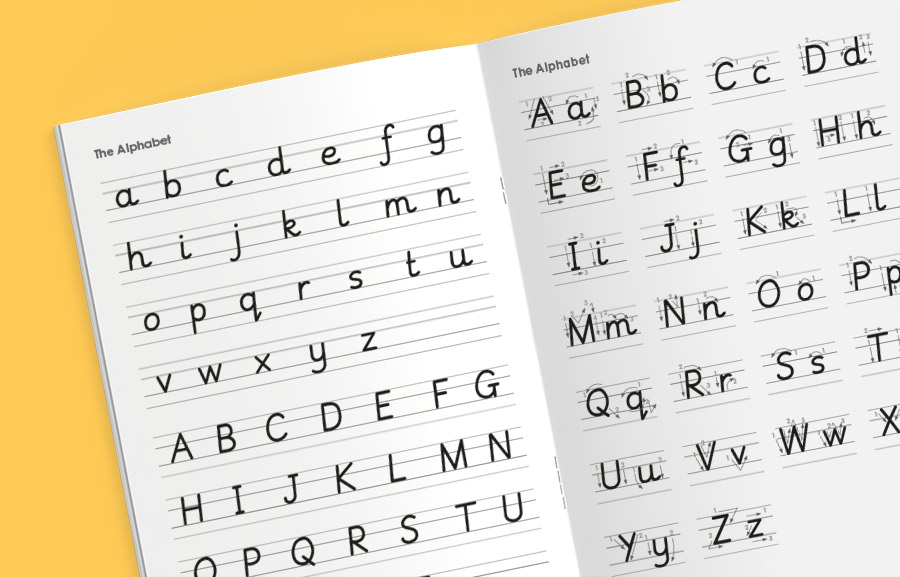Government research shows it’s the lowest-performing subject in Key Stages 1 and 2, with a clear gender gap: girls consistently outperform boys. Even before the pandemic, many children—especially boys—were leaving primary school without meeting expected levels in writing and reading. According to the National Literacy Trust, by the age of 11, more boys than girls left primary school not reading (31% vs 22%) and writing (26% vs 17%) at the expected level for their age.
Since then, things have only worsened. Lockdowns, disrupted schooling, and increased reliance on digital devices have pushed handwriting further down the priority list. In a world where most communication is typed, it’s easy to wonder: does handwriting still matter?
It does—and here’s why.

Table of Contents
Why Handwriting Is Better for Learning
Research consistently demonstrates that handwriting offers distinct advantages over typing when it comes to learning and cognitive development. Writing by hand requires intricate motor skills, engaging multiple regions of the brain in a way that typing on a keyboard does not. This enhanced brain activation has been shown to improve memory retention and facilitate deeper learning processes.
Reading Fluency
Handwriting also plays a crucial role in enhancing reading fluency. The tactile process of forming each letter by hand helps the brain to better recognise and process written language. This methodical approach reinforces understanding and retention of information. In contrast, typing involves repetitive key presses that do not stimulate the brain’s visual and motor systems to the same extent, potentially leading to weaker associations between letters and their meanings.
Deeper Understanding
Furthermore, the act of handwriting naturally slows down our thought processes. This deliberate pace allows for deeper comprehension as we engage more thoroughly with the material being written. It encourages us to think critically about what we are learning, fostering a more profound connection with the content. Typing, on the other hand, often promotes rapid and superficial processing, where information is transcribed without deeper reflection or understanding.
Encourages Reflection & Creativity
Handwriting also encourages reflection and creativity. The tactile experience of writing by hand can stimulate creative thinking and idea generation. Many writers and artists prefer handwriting for brainstorming and drafting because it allows thoughts to flow more freely and naturally than typing on a digital device.
In educational settings, handwritten notes have consistently shown benefits over typed notes. Students who take notes by hand tend to perform better in recall tests and demonstrate a deeper understanding of the material. This is because handwriting involves summarising and synthesising information in real-time, promoting active engagement and deeper processing of the content.
Additionally, the physical act of writing can improve fine motor skills and hand-eye coordination, which are essential for overall cognitive development, especially in younger learners.
Instilling a Love of Writing
Despite the concerning research findings about declining literacy, there’s a glimmer of hope: the National Literacy Trust discovered that more children began writing for fun during the lockdowns. This increase is significant because children who write for pleasure have been shown to enjoy better mental health. Writing stories, keeping diaries, and crafting poetry allow them to express their thoughts and feelings, providing a valuable outlet for self-expression.
The lockdowns may have given children more time and less pressure to conform to strict writing rules. Without the need to worry about strict rules such as using connectives, clauses, or adverbial phrases, students could simply enjoy the act of writing. This freedom can be a great relief, turning writing into a form of emotional release. Besides, this is different from the often rigid writing tasks in schools that can stifle creativity.
Supporting children to write freely for enjoyment can transform their educational experience. It makes writing less of a chore and more of an enjoyable activity, leading to a lifelong passion for it. This can benefit their academic performance and personal growth.
Supporting Handwriting Across the Key Stages
Children need to be taught handwriting across the key stages with an emphasis that these skills be used and further developed at home. The best way to engage a child in writing is to make it easy and achievable for them. Instilling a love and excitement for writing really is the key to developing a life-long writer. However, the journey from toddler to writer is long and involves more than just a good pencil grip.
In light of the recent findings, it is crucial that schools and parents take proactive steps to address this issue. One effective approach could be to align the teaching methods and materials with the national curriculum and custom exercise books. These custom exercise books can be tailored to meet the specific needs of each child, helping them to develop their handwriting skills at their own pace.

Writing Across the Key Stages
Any teacher worth their salt knows that good handwriting starts in the early years with the development of fine and gross motor skills. It is vital that these skills are strengthened, as early as possible. Not easy when some children have missed a lot of school due to lockdowns, but there is a lot that can be done – play dough, fine motor activities, balancing, core strengthening through yoga, play, dance. A child who cannot sit up comfortably is going to find sitting at a desk and writing very difficult and will not be able to sit for long.
At the primary stage, writing becomes more formalised and is practised more regularly. Children are asked to produce pieces of writing in the form of stories, reports, plans, and explanations. Posture and pencil grip must be corrected at an early age and correct letter formation should be practiced on a regular basis.
The current pressures to teach children proper grammar and technical writing skills are all very well, as long as they do not put children off writing out of fear of doing it wrong or the plain fact that not everyone finds grammar interesting. Therefore, these prescriptive ways of teaching handwriting should be balanced out with creative and exciting opportunities to write, without fear of failure.
There are many resources out there, that aim to help children become writers.
Here are a few of our favourites:
- The Literacy Trust should be your first port of call. They work as a charity to support schools and communities to improve the literacy skills of disadvantaged children. They have resources for all age groups as well as a Virtual School Library.
- Visit the library at least once a week. If your school has its own library, brilliant! Nothing can instil a love of literacy and writing more than the excitement of taking out a new book each week. If your school doesn’t, then try regular trips to the local library, or arrange for a mobile library to visit the school.
- Taking part in a writing competition is something that will excite and engage children in a school. This site has a comprehensive list of writing competitions for children aged 5-18.
- Sparklebox and Twinkl have many printable sheets for pencil control and handwriting practice. Not only this, but numerous templates to make books as well as themed borders for writing.
- Oxford Owl have a fantastic resource on their website – a breakdown of each key stage and links to tips on how to develop writing. These are useful to inform planning in schools and would also be great to share with parents.
Having regular opportunities to write is vital to help children develop handwriting skills, as well as a whole-school approach to writing. If children can see that writing is celebrated throughout the entire school, it will become important to them. It might be a good idea to develop a scheme where good examples of writing are shared – perhaps then younger children can aspire to be good writers and older children can help younger children to develop these skills.
Conclusion
In conclusion, addressing the decline in handwriting proficiency among primary school children, especially the gender gap with girls outperforming boys, is crucial. The pandemic has exacerbated these issues, with increased reliance on digital devices further diminishing handwriting practice. Despite these challenges, teaching proper handwriting remains essential.
Good handwriting builds confidence and pride, facilitating everyday tasks like writing cards and notes. Academically, clear handwriting can significantly impact test outcomes and prevent distractions during exams. Moreover, research shows that handwriting enhances memory retention, deeper comprehension, and creativity, offering cognitive benefits that typing does not.
Encouragingly, more children began writing for pleasure during lockdowns, suggesting that under less restrictive conditions, they can develop a love for writing. To support handwriting development, it is vital to start early with activities that strengthen motor skills. Schools and parents should adopt proactive approaches, using resources and teaching methods that make writing enjoyable and accessible.
Promoting regular handwriting practice, utilising custom exercise books, and fostering a supportive writing culture within schools can significantly improve handwriting skills. These strategies not only enhance literacy and cognitive development but also ensure children are well-equipped for their academic and personal lives.
At SPC, we feel that handwriting is a vital tool in a child’s education. This is why we developed a number of pages that fit into bespoke handwriting exercise books to support pupils at primary level. Customise your handwriting exercise books to include pages such as useful spellings, the alphabet, key words and more.
Empower Future Writers with Custom Exercise Books
Our expert team will design anything you need. Request your free sample and information pack to discover how easy it is to create customised exercise books for handwriting or any other subject